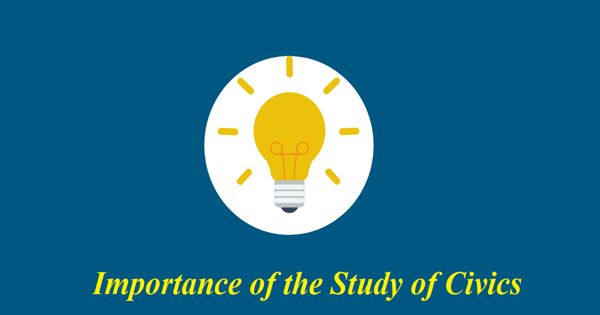Importance of the Study of Civics
Civics deals with the problems of citizenship. We are all citizens, – law-abiding members of a democratic state. In a totalitarian state: the state is the brain, the citizen is the only limb under the direction of the brain. But in a democratic state, every citizen has not only duties, but responsibilities; not only orders to carry out, but the duty to think. Hence every citizen must be fully conversant with the affairs of the state. Just as, when the state is in danger, he has to rush to its defense, so when the state is making a mistake, he must be ready with his criticism and advice. He is one of the mechanics who help run the state machinery, and however mumble his position, unless he knows its working he cannot render such help us may make the machine operate smoothly.
That being so it is in the interest of a democratic state to have intelligent, lightened, wide-awake citizens. The intellectual and moral level of the average citizen is the measure of a state’s progress and status. Hence the duty of the state is to educate its citizens. This, of course, is admitted even when it is not practiced. The question is – what should be the basis of that education.
Years ago in a broadcast address, Srinivasa Sastri made a powerful plea for making the study of civics compulsory in every school. His reasoning was sound. He said that since it was necessary to qualify for every profession, it should be made obligatory for every student to qualify himself for exercising his rights and duties as a citizen. He pressed this suggestion upon educational authorities with great sound arguments. It has been taken up by educational authorities these days though only partially, for the – study of the subject has become an important subject in our school and colleges.
Today in our republic, it is more than ever necessary to accept Srinivasa Sastri’s advice. For one thing, at intervals, we are called upon to exercise our franchise and elect our rulers. We cannot do so intelligently unless we are acquainted with our problems and are conscious of our political powers. This means that we must have a working knowledge of our economic condition and our political machinery. That is exactly where the study of civics comes in. it will teach us our place in the constitution and our rights guaranteed by it. It will also teach us the problems of economics and administration so that we can understand our rights in the state and vote intelligently at the election. Our discussions of national problems will not turn on our personal likes and dislikes but on principles and ideals. It will make us better citizens and help us to be better guardians of the state.
Therefore there is much point in making the study of civics compulsory in our secondary schools. Knowledge of the constitution under which we live, of our duties responsibilities to the state and to corporate life generally, and our rights in the state as citizens, will stand us in good stead in dealing with public affairs as they arise from time to time. The tendency so prominent today, of judging questions with reference to personalities instead of principles is dangerous in a democratic constitution and must be avoided. It may be avoided only if we are aware of our status in the constitution.
Besides, the social organization of the human family today a most complex and complicated phenomenon, Political and economic problems are so intimately interlinked that they have to be studied with care in order that the implication of a state policy may be properly understood. Politics today can no longer be the spare-time hobby of a busy man of affairs; it should be the specialized whole-time occupation of a man with proper equipment. The study of civics provides the groundwork upon which the intending politician may base his thoughts.
One idea thrown out by Srinivasa Sastri deserves something more than a passing notice. He said that those who wanted to take up a political or public career should be required to have a diploma in citizenship. The suggestion is original and one well worth considering. Most of our legislators are too little conversant with the principles of politics and economics. A theoretical knowledge would be a sound basis upon which practice might usefully develop. It will help transform the majority of our councilors from voting robots into intelligent participants in debates and discussions. The idea deserves to be pursued in the interest of the good government.
















